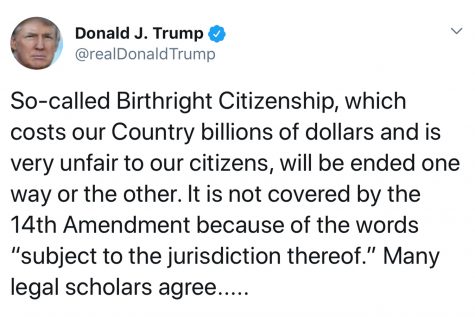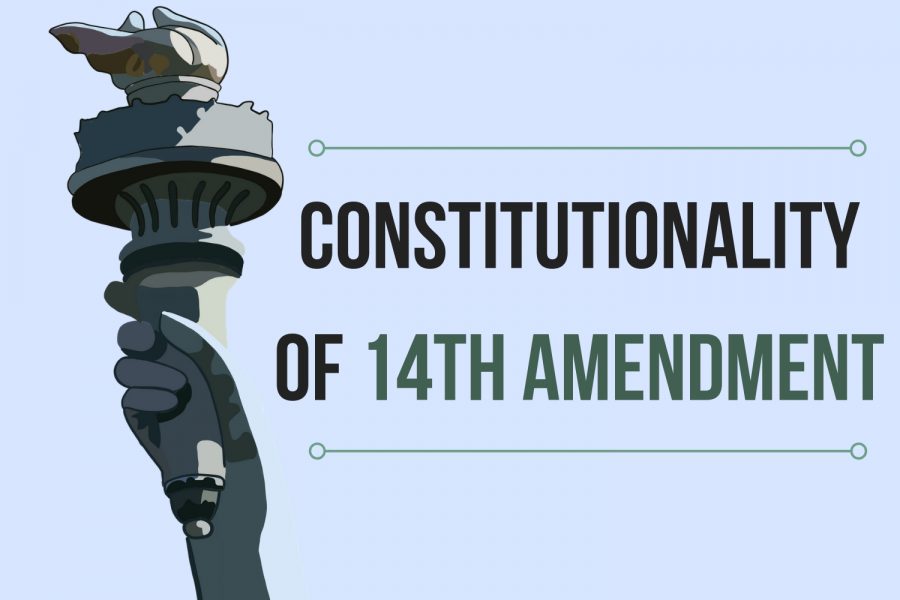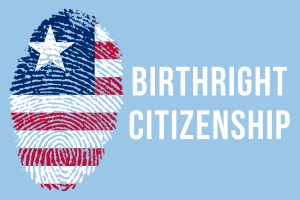Rights at birth
Birthright citizenship is protected by 14th Amendment
December 26, 2018
The stroke of a pen. In his view, that’s all it takes to end the wave of anchor babies. To end the flow of immigrants into this country, as if a stroke of a pen would erect bigger walls to keep them out. As if that stroke would destroy the hope these parents have for their children.
On Oct. 31 President Trump tweeted his sentiments about birthright and his willingness to get rid of it. Trump has been notorious when it comes to his ideas on immigration, but this might be the most far-fetched idea he has publicized since his whole “build-a-wall campaign.”
Eliminating birthright citizenship would do little to solve our immigration problem. Actually, it would have the opposite effect and increase the number of undocumented citizens within the country. The Migration Policy Institute study found that if citizenship were denied to every child with at least one unauthorized parent, the unauthorized population in the U.S. would reach 24 million by 2050. Ultimately, this idea does nothing to advance real immigration reform.
In my case, if my citizenship were denied, I would have been a stateless baby, since Mexico wouldn’t guarantee me citizenship either. I would have had to apply for citizenship, and my parents would have also had to prove that they were citizens, which is not only hard to do, but also expensive. Since Mexico is a developing country, many people within the country have little to nothing to prove that they are, in fact, citizens.
Aside from that, removal of birthright citizenship would go completely against Section One of the 14th Amendment, and in order to overwrite it, there would need to be another amendment ratified, and not an executive order — like Trump wants to do. The problem then arises with the fact that there has not been an amendment ratified since the 27th Amendment in 1992.

In order for an amendment to be ratified, it must first be proposed and approved by two-thirds of the House and the Senate and then sent to the states for a vote. Then, three-fourths of the states must affirm the proposed amendment. The fact that we need not only Congress to agree by a two-thirds majority but also the states to agree by a three-fourths majority makes such a controversial amendment practically impossible to ratify. Arguably, we are in the most polarized time period this country has experienced, and if this amendment were proposed, it would polarize the country even more, leaving us at a standstill.
Most supporters of the removal of the birthright citizenship clause of the 14th Amendment point out the context the amendment was written in. The 14th Amendment was ratified in 1868; it was one of main Reconstruction era amendments aimed at giving rights to slaves. Thus, they argue that birthright citizenship was meant only to be applied to slaves within the U.S. and not foreigners entering the country.
What is so ironic is that the main supporters of the removal of birthright citizenship are conservatives, who typically uphold a strict interpretation of the constitution. “All persons born or naturalized in the United States.” And in the philosophy of the average conservative, this is the part that guarantees birthright citizenship regardless of their parents.
All in all, Trump’s insistence on removing the birthright citizenship will end up getting lost in the Supreme Court or Congress — that is, if it even makes it there.















